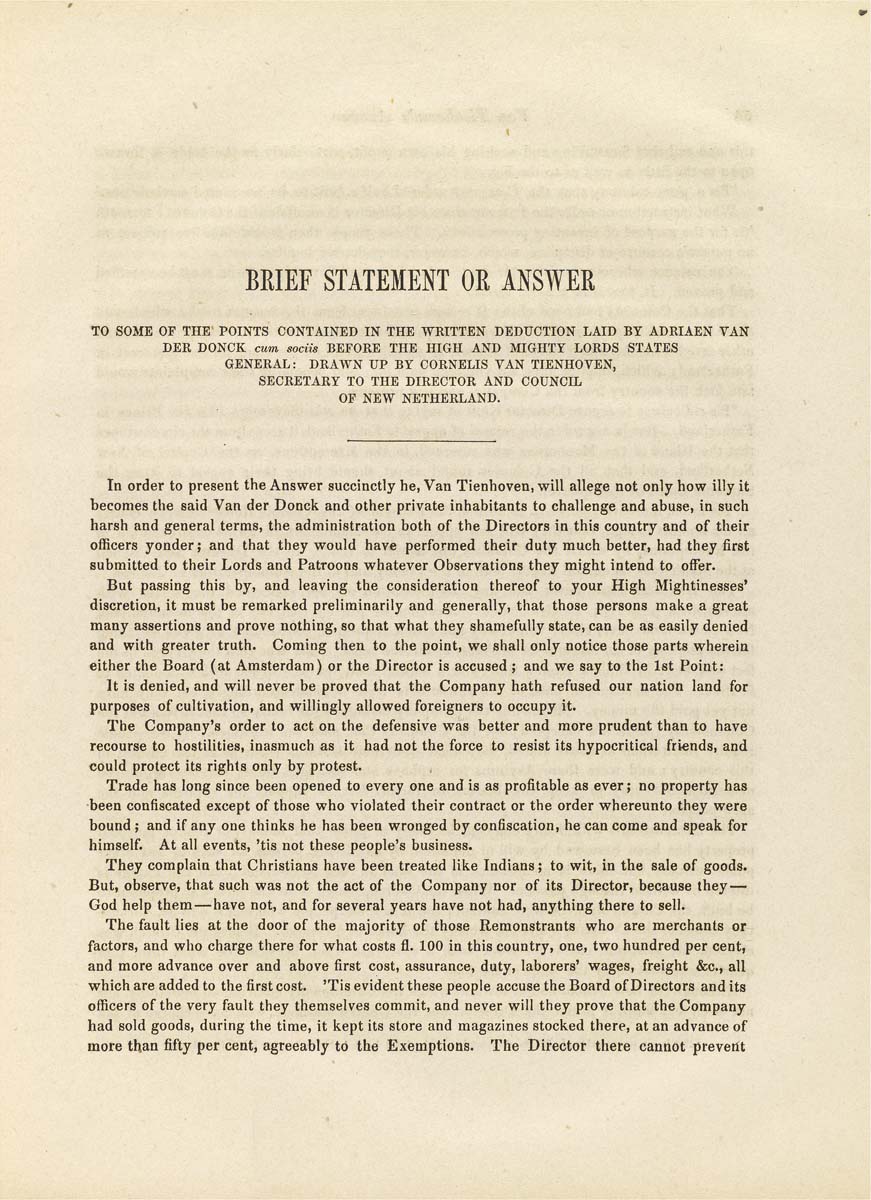BRIEF STATEMENT OR ANSWER
TO SOME OF THE POINTS CONTAINED IN THE WRITTEN DEDUCTION LAID BY ADRIAEN VAN
DER DONCK cum sociis BEFORE THE HIGH AND MIGHTY LORDS STATES
GENERAL: DRAWN UP BY CORNELIS VAN TIENHOVEN,
SECRETARY TO THE DIRECTOR AND COUNCIL
OP NEW NETHERLAND.
In order to present the Answer succinctly he. Van Tienhoven, will allege not only how illy it
becomes the said Van der Donck and other private inhabitants to challenge and abuse, in such
harsh and general terms, the administration both of the Directors in this country and of their
officers yonder; and that they would have performed their duty much better, had they first
submitted to their Lords and Patroons whatever Observations they might intend to offer.
But passing this by, and leaving the consideration thereof to your High Mightinesses'
discretion, it must be remarked preliminarily and generally, that those persons make a great
many assertions and prove nothing, so that what they shamefully state, can be as easily denied
and with greater truth. Coming then to the point, we shall only notice those parts wherein
either the Board (at Amsterdam) or the Director is accused ; and we say to the 1st Point:
It is denied, and will never be proved that the Company hath refused our nation land for
purposes of cultivation, and willingly allowed foreigners to occupy it.
The Company's order to act on the defensive was better and more prudent than to have
recourse to hostilities, inasmuch as it had not the force to resist its hypocritical friends, and
could protect its rights only by protest.
Trade has long since been opened to every one and is as profitable as ever; no property has
been confiscated except of those who violated their contract or the order whereunto they were
bound ; and if any one thinks he has been wronged by confiscation, he can come and speak for
himself. At all events, 'tis not these people's business.
They complain that Christians have been treated like Indians; to wit, in the sale of goods.
But, observe, that such was not the act of the Company nor of its Director, because they—
God help them—have not, and for several years have not had, anything there to sell.
The fault lies at the door of the majority of those Remonstrants who are merchants or
factors, and who charge there for what costs fl. 100 in this country, one, two hundred per cent,
and more advance over and above first cost, assurance, duty, laborers' wages, freight &c., all
which are added to the first cost. 'Tis evident these people accuse the Board of Directors and its
officers of the very fault they themselves commit, and never will they prove that the Company
had sold goods, during the time, it kept its store and magazines stocked there, at an advance of
more than fifty per cent, agreeably to the Exemptions. The Director there cannot prevetit
|








